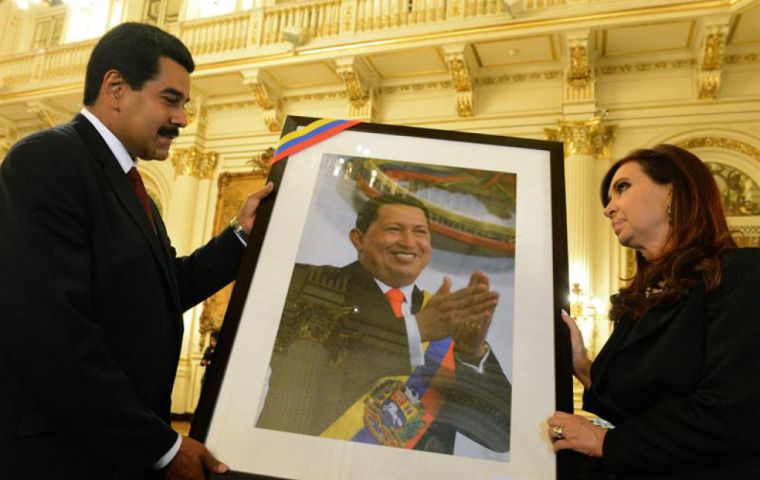MercoPress. South Atlantic News Agency
Argentina: Overprices of up to 90% in sales to Venezuela detected
 The audit body compared the invoices paid by the Bolivarian State for these products with the export prices used by Argentine companies and detected overpricing of up to 90% in some products.
The audit body compared the invoices paid by the Bolivarian State for these products with the export prices used by Argentine companies and detected overpricing of up to 90% in some products. Inconsistencies were found in binational businesses for overpricing and irregular billing for more than 20,000 million dollars between Venezuela and Argentina. According to a report from the General Syndicature of the Nation (Sigen), which was accessed by the newspaper La Nación, between 2012 and 2016 at least 15 Argentine companies would be involved in the escrow between the two countries.
Companies in the dairy industry, such as Sancor and others specialized in the sale of chickens, such as Granja Tres Arroyos, were some of those involved in the sale of products to the Caribbean country with overpricing of more than $ 235 million, according to the Sigen.
Sancor was the company that overpriced the products sold to Venezuela: it invoiced a total of $ 403 million for the sale of powdered milk, with a 23% increase compared to the reference prices. That is, it was left with a difference of $ 95 million, according to the study conducted by the Sigen.
From Sancor they told La Nación that they sold powdered milk to Venezuela with higher prices due to lack of security in payments. They recalled that the Venezuelan government still owes a figure close to $ 30 million and remarked that there was no type of irregularity.
The justice investigates in these surcharges a possible transnational bribe, that is to say, the crime of the Argentine companies as participants in a fraud to the Venezuelan State. But researchers also point to the alleged complicity of Kirchner officials, who assured companies to enter that market.
The audit body compared the invoices paid by the Bolivarian State for these products with the export prices used by Argentine companies and detected overpricing of up to 90% in some products.
”All the commercial operations of Sancor with Venezuela were controlled by the AFIP (Federal Administration of Public Revenues), the Central Bank and the National Institute of Associations and Social Economy (Inaes). The operations were transparent at all times and can be verified in the public accounts,” Sancor said.
Another company involved in the premiums is Bioart, a firm of the Vignati family. They sold corn, milk powder, rice and oil to Venezuela with a total premium of US $ 57 million, according to the Sigen. In addition to their investment in Bioart, the Vignati used to frequent José María Olazagasti, the right-hand man of the then minister Julio De Vido and who maintained relations with Venezuelan government.
The Tucumán company Paramérica SA also invoiced with surcharges: it sold pulses and corn with a price superior to the one of market for $ 38 million, indicates the Sigen. But it also exported soy for a lower price than the market, which caught the attention of the researchers.
The price premiums for sales to Venezuela also involve several companies dedicated to the sale of frozen chicken, such as Granja Tres Arroyos ($ 17 million), Las Camelias ($ 8 million), Soychu ($ 14 million) and Rasic Hnos. ($ 3 million).
Granja Tres Arroyos said that they were selling to Venezuela at a higher price for various problems caused by transactions with this client.
The Sigen audit does not include, however, price comparisons for other companies engaged, for example, in the sale of technology products for Venezuela, such as Coradir SA, Novatech SA and Unitek, which invoiced hundreds of millions of pesos within the escrow.
Nor do they include the prices that all the companies of José Levy billed, a businessman who became a millionaire with the sale of products to Venezuela. In 2011, the entrepreneur had declared assets for $ 1 million before the AFIP, but after doing business with the trust, he entered into the money laundering a fortune of $ 1,400 million. During those years, the businessman had forged relations with Olazagasti, the man behind the “parallel diplomacy” with the late former president Hugo Chávez.




Top Comments
Disclaimer & comment rules-

-

Read all commentsAnd who was President for most of the time, one guess chaps? EM will no doubt enlighten us.
Jun 09th, 2019 - 10:14 am +1THAT's what I call as “brotherhood-spirit”!
Jun 12th, 2019 - 01:07 pm 0Commenting for this story is now closed.
If you have a Facebook account, become a fan and comment on our Facebook Page!